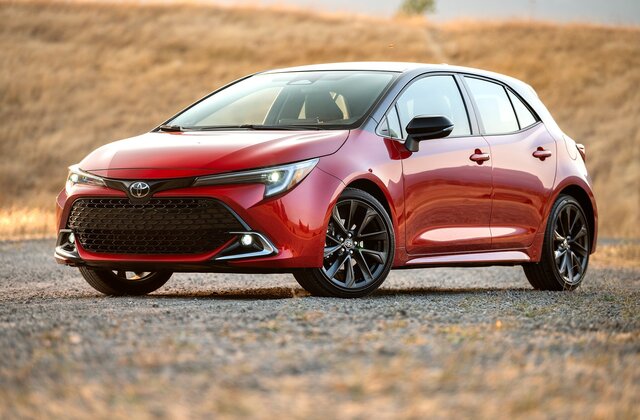On the open road: Evaluating the suitability of sports cars for long distance driving
Sports cars are often associated with speed, agility, and a thrilling driving experience. They are typically designed to handle well on winding roads and provide an adrenaline rush when you push them to the limit. However, when it comes to long-distance driving, sports cars might not be the first choice for most people. With limited storage space, stiff suspension, and uncomfortable seats, sports cars can be challenging to drive on long journeys. But does that mean you should avoid taking a sports car on a road trip? In this blog post, we will evaluate the suitability of sports cars for long-distance driving. We’ll cover everything from the comfort and storage space to fuel efficiency and handling, to help you decide whether a sports car is the right choice for your next big road trip.
1. Introduction to the allure of sports cars for long distance driving
Sports cars have always captivated the imagination of car enthusiasts, with their sleek designs, powerful engines, and thrilling performance. They are often associated with speed, adrenaline, and the thrill of the open road. However, when it comes to long distance driving, some may question the suitability of sports cars. Are they comfortable enough? Can they handle the demands of extended journeys? In this article, we delve into the allure of sports cars for long distance driving and evaluate their practicality.
One of the main reasons why sports cars are enticing for long distance driving is their exceptional performance. These vehicles are engineered to deliver exhilarating acceleration and precise handling, making them a joy to drive on winding mountain roads or open highways. The responsive steering, advanced suspension systems, and aerodynamic designs enhance the driving experience, allowing drivers to feel connected to the road like never before.
Moreover, sports cars often boast powerful engines that provide ample horsepower, allowing for effortless overtaking and maintaining high speeds on long stretches of highway. This can be especially advantageous when covering long distances, as it reduces the time spent on the road and enhances the overall driving experience.
Beyond their performance capabilities, sports cars also offer a level of comfort and luxury that may surprise some. While they may not have the spaciousness of a sedan or SUV, modern sports cars are equipped with advanced features and technologies to ensure a comfortable ride. Ergonomically designed seats with ample support, adjustable driving positions, and high-quality materials contribute to a comfortable and enjoyable driving experience, even during lengthy journeys.
Furthermore, advancements in technology have led to the integration of various convenience features in sports cars. From advanced infotainment systems and smartphone connectivity to navigation systems and driver-assistance features, these vehicles are equipped with the latest innovations to enhance comfort, convenience, and safety on long drives.
While sports cars may not be the first choice for practicality or cargo space, their allure lies in the unique combination of performance, style, and driving pleasure they offer. For those who prioritize the thrill of the journey over sheer utility, sports cars can provide an unmatched experience on the open road. In the following sections, we will explore the factors to consider when evaluating the suitability of sports cars for long distance driving, helping you make an informed decision before embarking on your next road trip.
2. The pros and cons of sports cars for long distance trips
Sports cars have always had a certain allure and appeal that sets them apart from other vehicles. Their sleek designs, powerful engines, and nimble handling make them a joy to drive on winding roads and open highways. However, when it comes to long distance trips, sports cars can present both advantages and disadvantages that should be carefully considered.
On the positive side, sports cars are built for performance, which means they often offer exceptional acceleration and top speeds. This can be a major advantage when you need to cover long distances quickly, allowing you to enjoy the thrill of the open road. Additionally, sports cars are typically equipped with advanced suspension systems and comfortable seating, providing a smooth and enjoyable ride for extended periods of time.
Another benefit of sports cars for long distance driving is their compact size. With their low profiles and aerodynamic shapes, sports cars are easier to maneuver and park in crowded areas compared to larger vehicles. This can be particularly advantageous when navigating through urban areas or finding parking spaces during your journey.
However, it’s important to consider the potential drawbacks of sports cars for long distance trips as well. One of the main concerns is their limited storage space. Sports cars are designed with a focus on performance rather than practicality, often sacrificing trunk space for sleek aesthetics. This can pose a challenge when it comes to carrying luggage, especially if you’re traveling with a companion or require additional equipment for your trip.
Another factor to consider is the firm suspension and low ground clearance typically found in sports cars. While these features enhance the car’s handling and stability at high speeds, they can also lead to a stiffer ride, making it less comfortable for extended periods behind the wheel. Additionally, the low ground clearance can be problematic when encountering uneven or bumpy roads, potentially causing damage to the car’s undercarriage.
In conclusion, sports cars can be a thrilling choice for long distance driving, offering exceptional performance and an exhilarating driving experience. However, it’s important to weigh the pros and cons before embarking on your journey. Consider factors such as storage space, comfort, and practicality to ensure that your sports car is well-suited for the specific demands of a long distance trip.
3. Comfort and ergonomics: Assessing the practicality of sports cars
When it comes to long distance driving, comfort and ergonomics play a crucial role in determining the suitability of sports cars. While sports cars are often associated with sleek designs and powerful engines, their practicality for extended journeys should not be overlooked.
One key aspect to consider is the seating arrangement. Sports cars typically feature low-set seats that hug the driver and passenger, providing a snug racing-inspired feel. While this may be desirable for shorter drives or spirited jaunts, it can become less comfortable during long hours on the road. The lack of adjustability and limited legroom may lead to fatigue and discomfort, especially for taller individuals.
Additionally, the suspension system of sports cars is designed to prioritize handling and agility over a plush ride. This can result in a stiffer and more rigid suspension, which may be less forgiving on uneven or bumpy roads. Potholes and road imperfections can be felt more intensely, potentially causing a less smooth and enjoyable driving experience.
Another important factor to consider is storage space. Sports cars are often designed with a focus on aerodynamics and sleek lines, which can limit the availability of cargo space. The compact trunk size may not be sufficient for carrying larger items or multiple bags, making it challenging for those who require ample storage for long trips.
However, it’s worth noting that not all sports cars are created equal in terms of comfort and practicality. Some manufacturers have recognized the demands of long-distance driving and have incorporated features to enhance comfort. These can include adjustable seating positions, improved suspension systems, and increased cargo capacity.
Ultimately, the suitability of sports cars for long distance driving depends on individual preferences and priorities. If the thrill of driving a sports car outweighs the potential drawbacks in comfort and practicality, then hitting the open road in a sleek and agile machine can still be a thrilling and enjoyable experience.
4. Cargo space and storage considerations for longer journeys
When embarking on a long distance road trip, one crucial aspect to consider is the cargo space and storage capabilities of your sports car. While sports cars are renowned for their sleek and compact designs, this very attribute can pose a challenge when it comes to accommodating luggage and essentials for an extended journey.
Before setting off, it is essential to evaluate the available cargo space within your sports car. Take note of the trunk capacity and any additional storage compartments or cubbies that may be present. While sports cars may not offer the same generous cargo space as larger vehicles, innovative design features and clever utilization of available space can make a significant difference.
To optimize storage capacity, consider investing in travel-friendly accessories such as roof racks or cargo boxes. These additions can provide additional room for larger items such as suitcases, camping gear, or sports equipment without compromising interior comfort.
Furthermore, it is crucial to plan and pack efficiently for your journey. Prioritize essential items and be mindful of the limited space available. Utilize packing cubes or compression bags to maximize the use of available space and keep belongings organized.
Another consideration is the accessibility of storage areas within the car. Ensure that frequently needed items are easily accessible without the need to unpack or disrupt the entire cargo area. This will save time and effort during rest stops or when retrieving essential items on the road.
Lastly, don’t forget to take into account the weight distribution of your packed belongings. Aim for an even distribution of weight to maintain optimal balance and stability while driving.
By carefully evaluating the cargo space and storage considerations of your sports car before embarking on a long distance journey, you can ensure a comfortable and organized trip without compromising the thrill and enjoyment of driving a sports car on the open road.
5. Fuel efficiency and mileage: Can sports cars be fuel-efficient on long trips?
When it comes to long distance driving, one of the primary concerns for any car owner is fuel efficiency. Sports cars, known for their powerful engines and exhilarating performance, often face questions about their ability to deliver good mileage on extended journeys. But can sports cars be fuel-efficient on long trips?
While it is true that sports cars are designed for speed and agility rather than fuel economy, advancements in automotive technology have allowed manufacturers to improve their fuel efficiency without compromising performance. Many modern sports cars now come equipped with features such as direct fuel injection, turbocharging, and hybrid powertrains, which contribute to better fuel economy.
Additionally, aerodynamic enhancements, lightweight construction materials, and advanced transmission systems have further increased the efficiency of sports cars. These advancements help reduce drag and optimize power delivery, resulting in improved mileage on the open road.
However, it is important to note that sports cars are still designed to deliver high-performance driving experiences. As a result, they may not match the fuel efficiency of smaller, more fuel-efficient vehicles designed specifically for long-distance commuting.
When evaluating the suitability of sports cars for long-distance driving, it is crucial to consider factors such as driving habits, route conditions, and personal preferences. While some sports cars may offer impressive fuel efficiency for their class, others may have a higher thirst for fuel due to their powerful engines and aggressive driving capabilities.
Ultimately, the decision to use a sports car for long trips depends on the individual’s priorities and preferences. If the thrill of driving a high-performance vehicle outweighs concerns about fuel consumption, then a sports car can still offer an enjoyable and exciting experience on long-distance journeys. However, for those primarily seeking fuel efficiency and cost-effectiveness, opting for a more fuel-efficient vehicle may be a more practical choice.
6. Performance and handling: How sports cars fare on different road conditions
When it comes to evaluating the suitability of sports cars for long distance driving, one crucial aspect to consider is their performance and handling on different road conditions. Sports cars are known for their agility, speed, and precise handling, which make them a favorite among enthusiasts on smooth and winding roads. However, how do they fare when faced with different terrains and varying weather conditions?
One of the key factors to examine is the suspension system of a sports car. A well-designed suspension system can make a significant difference in providing a comfortable ride and maintaining stability on uneven or bumpy roads. It should effectively absorb shocks and vibrations, ensuring that the driver and passengers have a smooth and enjoyable experience even during extended journeys.
Another essential aspect is the traction control and stability systems of the sports car. These systems help to optimize the grip and stability of the vehicle, especially when encountering wet or slippery surfaces. By constantly monitoring the traction of each wheel and adjusting power distribution accordingly, a sports car equipped with advanced traction control can provide enhanced handling and improve safety even in challenging conditions.
Moreover, the type of tires fitted to the sports car plays a crucial role in determining its performance on different road surfaces. Sports cars often come equipped with high-performance tires that offer excellent grip and responsiveness on dry roads. However, it is important to ensure that these tires are also capable of providing sufficient traction on wet or snowy roads, as this can significantly impact the overall driving experience during long distance trips.
Additionally, the weight distribution of a sports car is a vital factor in its handling characteristics. Most sports cars are designed with a low center of gravity, thanks to their lightweight construction and aerodynamic profiles. This feature enhances stability and agility, allowing the car to navigate sharp turns and corners with precision. However, it is essential to keep in mind that some sports cars may have a stiffer suspension setup to enhance performance, which can result in a slightly firmer ride on rough or uneven road surfaces.
In conclusion, while sports cars are typically associated with exhilarating performance and exceptional handling on smooth roads, their suitability for long distance driving depends on various factors. These include the suspension system, traction control and stability systems, tire selection, and weight distribution. By evaluating these aspects, potential buyers can make an informed decision about whether a particular sports car is suitable for their desired type of driving, including long distance journeys.
7. Safety features and technologies in sports cars for enhanced long distance driving
When embarking on a long distance journey in a sports car, ensuring the safety of both the driver and passengers is of paramount importance. While sports cars are typically known for their speed and performance, they also come equipped with advanced safety features and technologies to provide a secure and comfortable driving experience.
One crucial safety feature to consider is the presence of electronic stability control (ESC) systems. These systems actively monitor the car’s movements and apply individual brakes to specific wheels, helping to maintain control and prevent skidding or sliding on slippery surfaces. This is particularly useful when encountering unexpected weather conditions or navigating winding roads during a long drive.
Another important feature is the inclusion of adaptive cruise control (ACC) systems. These systems utilize radar sensors to detect the distance and speed of vehicles ahead, automatically adjusting the car’s speed to maintain a safe following distance. ACC can be especially beneficial during long highway stretches, allowing the driver to relax and focus more on the journey itself.
Furthermore, sports cars often come equipped with advanced driver-assistance systems (ADAS) such as lane departure warning, blind spot monitoring, and forward collision warning. These technologies provide additional layers of protection by alerting the driver to potential hazards and assisting in preventing accidents – crucial aspects when driving for extended periods.
In terms of active safety, many sports cars are equipped with high-performance braking systems. These systems feature larger brake discs, improved calipers, and advanced braking technologies, ensuring shorter stopping distances and enhanced control during emergency situations.
Additionally, the inclusion of reinforced chassis structures and multiple airbags in sports cars further enhances safety. These features work together to provide increased protection in the event of a collision, minimizing the risk of injuries and maximizing occupant safety.
It is important to note that while sports cars offer an exhilarating driving experience, their safety features and technologies should not be overlooked, especially when embarking on long distance drives. Evaluating these features will not only enhance the overall safety of the journey but also provide peace of mind for the driver and passengers, allowing them to fully enjoy the open road.
8. Maintenance and reliability: Are sports cars dependable for extended journeys?
When it comes to evaluating the suitability of sports cars for long-distance driving, one crucial aspect to consider is their maintenance and reliability. Sports cars are known for their high-performance engines, sleek designs, and exhilarating driving experiences. However, some may question whether these vehicles can withstand the demands of extended journeys without encountering mechanical issues or breakdowns.
Maintenance plays a vital role in the overall reliability of any car, including sports cars. Regular servicing and upkeep are necessary to ensure that the vehicle’s components are in optimal condition. This includes checking and replacing fluids, inspecting the brakes, tires, and suspension, as well as addressing any potential issues before they escalate. Sports car owners who prioritize maintenance and adhere to recommended service schedules can significantly increase the reliability of their vehicles for long-distance trips.
Reliability is another important factor to consider. While sports cars are engineered to deliver impressive performance, it’s crucial to assess their track record for reliability over extended periods. Some sports car models have proven to be highly dependable, with well-built engines and solid mechanical components that can handle the rigors of long-distance driving. However, it is essential to research specific models and their reliability ratings before embarking on a lengthy journey.
Furthermore, it is recommended to invest in sports cars from reputable manufacturers with a history of producing reliable vehicles. This not only ensures better quality but may also provide access to comprehensive warranty programs and reliable servicing options.
Additionally, proper preparation before setting off on a long-distance trip can significantly reduce the chances of encountering issues. Conducting a thorough pre-trip inspection, which includes checking tire pressure, fluid levels, and ensuring all lights are functioning correctly, is essential. Carrying a spare tire, essential tools, and having access to emergency roadside assistance can provide peace of mind and help mitigate potential problems on the road.
While sports cars may require careful attention to maintenance and reliability, many enthusiasts find that the thrill and excitement of driving these vehicles outweigh any potential concerns. With proper care and consideration, sports cars can indeed be dependable companions on long-distance journeys, providing an exhilarating driving experience while still ensuring a reliable and enjoyable trip.
9. Cost considerations: Weighing the expenses of owning and maintaining a sports car
Before embarking on long distance road trips with a sports car, it is crucial to carefully evaluate the cost considerations associated with owning and maintaining such a vehicle. While sports cars may exude a sense of style and excitement, their upkeep can often be more expensive compared to regular cars.
First and foremost, the initial investment required to purchase a sports car tends to be higher. These high-performance vehicles often come with a hefty price tag, reflecting their advanced engineering, cutting-edge technology, and luxurious features. Furthermore, insurance premiums for sports cars can be significantly higher due to their increased risk of accidents and theft.
Maintenance costs also need to be factored in when assessing the suitability of a sports car for long distance driving. Sports cars typically require specialized maintenance and repairs, often necessitating the expertise of skilled mechanics or authorized service centers. Spare parts for sports cars can be more expensive and harder to find compared to those for mainstream vehicles. Regular maintenance, including oil changes, tire rotations, and brake inspections, are crucial to keep the sports car in optimal condition, but these services can also come with a premium price tag.
Fuel efficiency is another aspect to consider when deliberating on the expenses of owning a sports car. Most sports cars have powerful engines designed for speed and performance, but this often translates into lower fuel efficiency. Consequently, long distance trips in a sports car may require more frequent refueling stops, resulting in higher fuel costs.
Depreciation is a significant factor to bear in mind as well. Sports cars tend to depreciate at a faster rate compared to other vehicles, especially as newer and more advanced models enter the market. This can result in a greater loss of value over time, impacting the potential resale or trade-in value of the sports car.
While the allure of owning a sports car is undeniable, it is essential to carefully evaluate the financial implications associated with long distance driving. Balancing the excitement and thrill of a sports car with the potential expenses can help make an informed decision about whether it is a practical and economically viable option for extended road trips.
10. Personal preference and individual driving style: Determining if a sports car is suitable for your long distance adventures
When it comes to long distance driving, personal preference and individual driving style play a significant role in determining the suitability of a sports car. While some may find the sleek design, powerful engine, and sporty handling of a sports car exhilarating even on long journeys, others may prefer a more comfortable and practical option.
One of the key factors to consider is the seating position and comfort level offered by the sports car. Some sports cars have low seating positions and tight interiors, which may not be suitable for individuals who prioritize comfort and need ample legroom. However, if you enjoy the feeling of being close to the ground and crave the connectedness to the road that sports cars provide, then these factors may not be a concern for you.
Additionally, the suspension system of a sports car can greatly impact its suitability for long distance driving. Sports cars are designed to deliver sharp and precise handling, often at the expense of ride comfort. If you value a smooth and comfortable ride over aggressive cornering capabilities, a sports car may not be the best choice for your long-distance adventures.
Furthermore, driving style plays a crucial role in determining the suitability of a sports car for long distance travel. If you have a more relaxed driving style, preferring a leisurely pace and laid-back cruising, a sports car may not be the ideal option. Sports cars are engineered for spirited driving, and their performance capabilities may not be fully utilized during leisurely journeys.
Ultimately, the decision to opt for a sports car for long distance driving is highly subjective and dependent on personal preferences and driving style. It’s essential to consider factors such as comfort, handling, and driving habits before embarking on a long journey in a sports car. Understanding your own preferences and evaluating how they align with the characteristics of a sports car will help you make an informed decision and ensure a satisfying and enjoyable driving experience on the open road.











+ There are no comments
Add yours